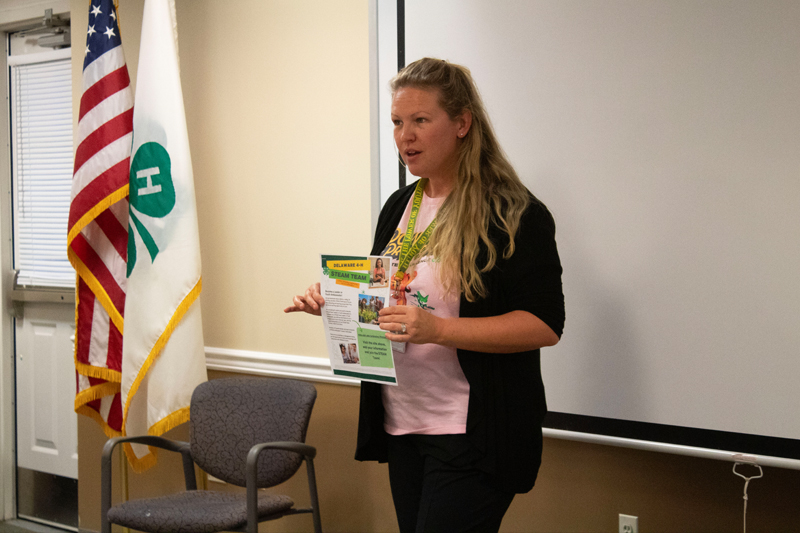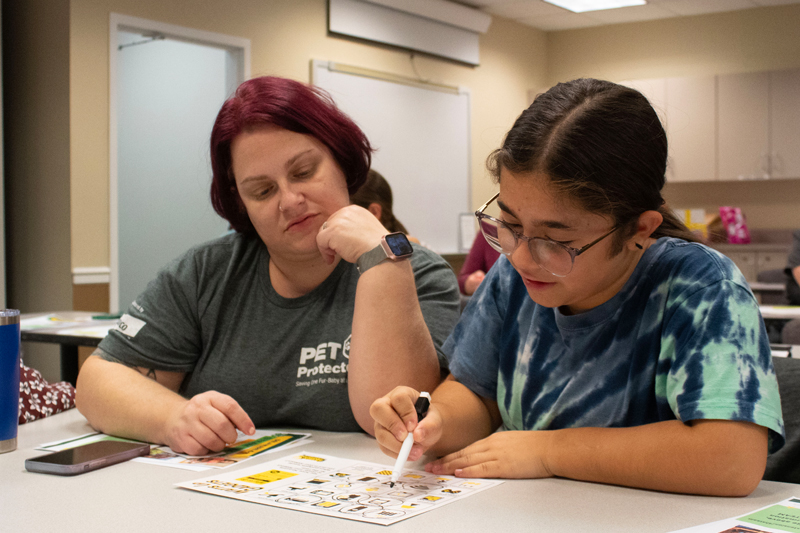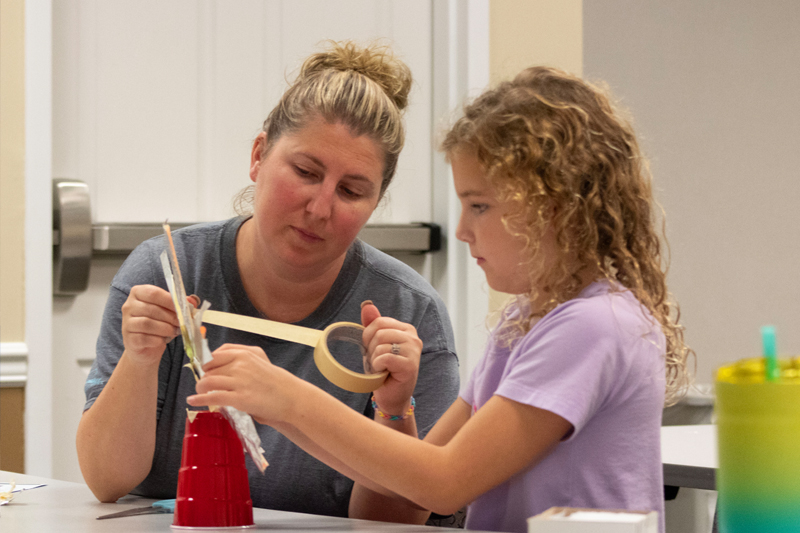


Full ‘STEAM’ ahead
Photos by Jeremy Wayman December 07, 2023
New 4-H science educator wants to use agriculture to help Delaware youth succeed in science, technology, engineering, arts and math
4-H is the largest youth development organization in the country. Plenty of folks know (or think they know) what 4-H participants do. It’s living on a farm and raising livestock, right?
Well, the youth organization offers much more. Thanks to University of Delaware Cooperative Extension and the generosity of UD donors Jim and Tina Collins, 4-H is equipping Delaware kids and teenagers with science, technology, engineering, art and math (STEAM) skills, giving them a sense of community and valuable skills for life.
Twila Parish-Short, a 4-H youth development science educator with UD Cooperative Extension, is incorporating those five disciplines into educational programming and activities for children and teenagers around the state. She is developing a team of teenage ambassadors, as she calls them, to lead youth in STEAM education and activities. The hope, Parish-Short said, is for those ambassadors to bring the activities back to their communities, help young people explore their interest in STEAM fields, and broaden 4-H’s reach.
“I’m envisioning these young STEAM ambassadors building their confidence to get into STEAM careers,” Parish-Short said. “We’re living in a world right now where youth need more outside of the classroom STEAM-themed activities to build on their interests, have fun and be innovative. We need programming that supports what teachers are already doing, and can build on youths’ interests, talents and capabilities.”
Parish-Short said she hopes the STEAM Team will be known throughout Delaware as a program that supports teachers and builds youth leaders in the fields of STEAM education.
The STEAM Team
On an October evening, children, teenagers and parents joined Parish-Short in Dover, Delaware, for her first STEAM Team. They formed groups to work on activities for this year’s 4-H STEM Challenge from the National 4-H Council, an activity that brings kids together to take part in STEM-related activities.
The inaugural event brought together 12 children and teenagers and eight parents at the UD Paradee Center in Dover.
Children and teens were given projects on renewable energy. They chose an energy source to power a fictional bunker. Then, they built prototypes for those renewable energy sources using arts and crafts materials provided by Parish-Short.
“It was awesome,” Parish-Short said. “It was exactly as I imagined it to be.”
It wasn’t all about learning and creativity. The goal of this and future events is to recruit people to be STEAM ambassadors. And Parish-Short is receiving plenty of interest there. By the end of the night, four young women ages 12 to 15 and one young man about to turn 12 wanted to be ambassadors for her STEAM team initiative.
Parish-Short, who taught biology, environmental science and STEM education in public schools, charter schools and Delaware State University before coming to UD, said her experiences in the classroom have prepared her to create meaningful, impactful lessons and experiences for Delaware youth.

What happened during the first STEAM Team meet was exactly what she anticipated it to be. Children and teens were engaged in their learning. They became engineers in designing their own renewable energy prototype.
“Seeing the excitement on their faces while they explained their model made me know this program will be a success,” Parish-Short said.
As a science educator, it’s Parish-Short’s job to facilitate and market STEAM activities for youth. She sees herself as a resource who will help provide STEAM curricula to anyone, including schools, libraries and any other outreach programs that are interested.
Jennifer Volk, interim associate dean and interim director for UD Cooperative Extension, is excited about the future for the science educator position. She hopes Cooperative Extension will be able to work with Parish-Short to develop a pipeline for students who could ultimately come to study in the UD College of Agriculture and Natural Resources (CANR).
“The science educator will expose them to different types of disciplines and get them excited about doing science, whether it’s plant science, animal science, science around economics and the marketing of products,” Volk said. “Our vision would be to really develop this program and expose students not only to STEAM but to expose them to UD and our college.”

Connecting to agriculture
The October STEAM team event was a recruitment one for Parish-Short. She’s working to connect her curricula to agricultural science.
That’s because Parish-Short’s position is made possible by a donation from a UD alumnus heavily involved in agricultural science for decades.
Jim Collins is the retired CEO of global agriculture chemical and seed company, Corteva Agriscience, which was formerly headquartered in Delaware. Collins and his wife, Tina, created the James C. Collins Jr. ’97M and Tina L. Collins 4-H STEM Education Fund in the College of Agriculture and Natural Resources to create a 4-H STEM Science Educator position and hire someone to lead STEM-related activities in 4-H throughout Delaware. The funds are used for five years to support the position and the program.
Collins received his MBA from the UD Alfred Lerner College of Business and Economics and his son Trey graduated UD with a bachelor's degree in chemical engineering.
After he retired as the CEO of Corteva on Dec. 31, 2021, Collins said he wanted a stronger connection to CANR. In October 2022, he joined the CANR Advisory Board, a group of alumni, business leaders, government officials and others who guide and support the college’s work.
“There isn’t a degree you can get in college that doesn’t have some applications in agriculture,” Collins said.
Collins had a handful of reasons for making his investment in UD Extension. He served on the boards for Future Farmers of America (FFA) and the National 4-H Council and understood the impacts those organizations could have on children in both rural and urban communities. He also wants to combat misperceptions about agriculture as a contributor to climate change and deforestation. Agriculture, Collins said, can be a major part of the solution to those environmental issues.
“I thought that if we could get to kids younger and younger and explain how cool agriculture was,” Collins said, “that we could not only make a real difference in those perceptions about agriculture later in life, but also attract them to consider careers in Ag.”
Collins also served on the board for Lone Oaks Farm in western Tennessee, which is run by the University of Tennessee Extension. The 4-H center at Lone Oaks merges agriculture, education, conservation and community development and helps connect children and teenagers to agriculture. The camp opened this year and is seen as a powerhouse for youth development.
“At the end of the day Lone Oaks Farm is using agriculture to teach science, technology, engineering and math,” Collins said. “Kids are coming home from this camp and saying to their parents, ‘this agriculture thing is really, really cool. I might want to do some more of that.’ Mission accomplished.”
Collins wants to see more camps with farms like this around the country. When he told the story about Lone Oaks Farm to Dan Sarkissian, UD assistant vice president of development and principal gifts, Sarkissian mentioned that UD Extension had wanted a dedicated staff member who could create 4-H science curricula for youth around the state. So Jim and Tina Collins worked with Sarkissian to make their donation to fund the science educator position.
Their donation funds the position, supporting programs and workshops, and event supplies needed. Collins said the science educator position is important because it will hopefully inspire youth to pursue careers in agriculture and will give agricultural companies a larger, more diverse pool of candidates for jobs they need, including scientist and engineering jobs.
“If we’ve educated folks on the wow of the science but also that they can apply it to agriculture,” Collins said, “I think it will be easier to recruit future employees.”
Including the arts
Although the Collinses’ donation was initially for a science educator position focused on STEM education, Parish-Short wanted to take her position a step further and include the arts, turning “STEM” into “STEAM.”
“I feel the importance of art in our youths’ lives is essential to them being able to express their interest in STEM education,” Parish-Short said.
And, she said, the arts can help make some activities more engaging for some children and teenagers who might struggle connecting with science, technology, engineering and math topics alone.
Volk, the interim director for UD Cooperative Extension, said Parish-Short’s position has been a dream position for UD Extension. And Parish-Short including the arts in her curriculum broadens the position’s reach.
“Sometimes you even see the ‘A’ stand for agriculture,” Volk said. “The idea is that a lot of times you can learn through multiple forms of media and try to really be interdisciplinary. By having arts incorporated, you can be creative while you’re learning about science.”
Helping 4-H reach more Delawareans
Like many other youth organizations, participation in Delaware 4-H declined since the COVID-19 pandemic began. Cooperative Extension leaders hope Parish-Short and her new position will help raise interest.
“Since the COVID pandemic, it’s been very difficult to get our 4-H programs back into schools,” said Doug Crouse, the state 4-H youth development program leader. “Programs aren’t going as much as they used to, so our numbers are down.”
Thanks to Jim and Tina Collins’ donation, Crouse said he sees 4-H participation numbers increasing in the years to come.
“I can't express enough that it's going to allow us to bring needed learning and education to the youth and 4-H,” Crouse said. “I’m hopeful that their generous philanthropy here will encourage others to want to do the same thing in the future to keep this momentum going.”
Parish-Short, for her part, continues to drum up participation in her STEAM Team initiative. She’s reaching out to teachers around the state and marketing herself as a resource for them. She hopes they’ll take her up on offers for field trips that feature STEAM activities.
Beyond that, she’d eventually like to turn to UD students to run her STEAM Team.
“This is a great opportunity to get those skills that you need to work with youth and be successful in your career,” Parish-Short said. “It really helps people too if they’re interacting with youth and trying to communicate in front of a group of people. It builds character.”
She continued, “The more we get this out to all UD students, I think the more successful this program is going to be.”
To become a STEAM ambassador, visit the UD Cooperative Extension 4-H STEAM Team webpage.
Contact Us
Have a UDaily story idea?
Contact us at ocm@udel.edu
Members of the press
Contact us at 302-831-NEWS or visit the Media Relations website

